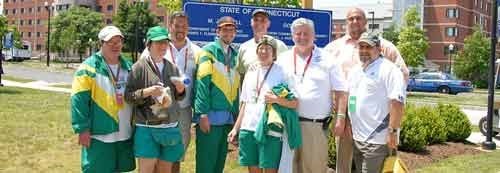 |
| Beau, Athletes, and Sponsors at SOCT Summer Games (Photo by K. Crockett) |
When you look through the archives of the MY HERO Project, you will find heroes from all walks of life representing all dimensions of social, economic, racial, ethnic, religious, and other backgrounds. You’ll also find that the thousands of different writers of the MY HERO stories choose to emphasize the particular virtues of their particular hero. And when you read these stories you probably wouldn’t be surprised to find heroes who are primarily characterized by such virtues as courage, perseverance, vision, or compassion; but you’ll find very few that emphasize the virtue of humility. Not because the heroes necessarily lack humility, but because I think humility is perhaps the least popular or understood of all the virtues.
I believe humility is not embraced as a primary virtue for heroes because it gets a bad rap. Too often when we think of humble persons, we think of those who let the world roll over them at will. Too often we believe that people who are humble hide their light under a rock. And in a culture that values and rewards self-promotion, humility doesn’t seem to be a very useful virtue either.
Of course, I may be wrong; but in my view humility is none of the above. Humility is knowing that you are not in charge of the world. It is knowing that the only thing we really have control over is our own attitudes, intents and actions. We cannot control other people and circumstances and we cannot control outcomes. In a phrase, humility is having the peace of mind to “accept the things we cannot change…the courage to change the things we can…and the wisdom to know the difference.”
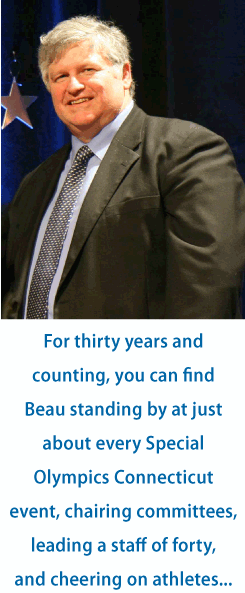 |
So when we look at the heroes of the present and the past, from visionary politicians to inspiring writers to social activists, we know that when it comes to the effective leadership or the successful promotion of a cause to “change attitudes and change lives,” a hero must embody at least an essence of humility. You see, I believe humility is a prerequisite to realizing heroic visions. Why?
To start, a heroic vision by definition requires humility. I can’t tell you how many hero stories involve a moment in time when the hero experienced an epiphany. This epiphany is often experienced as an electric wave up and down their spine, a tear down the corner of their eye, or a rage at a perceived injustice. And when they experience the epiphany they’re called by something far greater than themselves to leave the comforts of their old dispensations to address the issues that have so moved them. Rarely does a hero attribute their activism to themselves. Usually, they attribute their vision to a “source” or “higher power,” or “great spirit,” or “God.”
And when these heroes are moved to address issues, like the epidemic of AIDS, the tragedy of illiteracy, the ache of hunger, or the pain of a people exploited or excluded by others, invariably the vision for solving the problem is far greater than what one person can accomplish on his or her own. Heroes may be rugged individualists, but they are also dependent on others to help bring their dreams alive and keep them going long after the hero is gone. They know changing the world isn’t a do-it-yourself project. So it shouldn’t have surprised me that the President of Special Olympics of Connecticut, Robert “Beau” Doherty, was hard to nail down for an interview about his heroic efforts.
He’s not under wraps or inaccessible—for thirty years and counting, you can find him standing by at just about every Special Olympics Connecticut event, chairing committees, leading a staff of forty, and cheering on athletes—but his reputation for humility precedes him. When I told people that I wanted to interview Beau to celebrate his heroic contributions to the Special Olympics, and by extension to humanity, they warned me: “He doesn’t like to talk about himself,” “He credits everyone but himself for the success of the program,” and “He’s done so much for Special Olympics, but you won’t hear him say a word about his involvement.”
When I sat down with Beau, he was quick to point out, “It’s not about me. It’s about the athletes. It’s about the volunteers that make this thing work.” In other words, he still didn’t quite get my interest in doing a story about him. But there could be a whole book on Beau’s contributions to Special Olympics and beyond.
Let’s go back. Beau first began serving the intellectually and physically disabled when he was studying Wildlife Management at Maine’s Unity College in the late 70s. He took a summer job working at a camp for intellectually and physically disabled young people. There, he experienced first-hand the wonderful qualities and character of these individuals, and he’s been working to promote their equality ever since. Perhaps it was the first time he got a hug from one of his summer camp students. Or maybe it was the effusive gratitude they expressed when for the first time, thanks to Beau, they would experience a restaurant or a zoo or some other special place. Or maybe it was the outrage he felt when he witnessed first-hand the slurs that these young people would be subjected to. Whatever it was, this summer job sparked a lifelong passion in Beau.
Thirty-plus years ago, when Beau first started working with the intellectually disabled, we, as a society, were in the dark ages. More often than not, the intellectually disabled were shuffled off to institutions to keep them out of sight and out of mind. They were the victims of horrendous prejudice. Beau himself remembers times when he would take intellectually disabled students into public venues, where the manager or proprietor would say, “You’re welcome here, but get these ‘R-words’ out of here.” Slurs and prejudgments about the character and abilities of the intellectually disabled were widespread. They had equal access to virtually nothing. They were completely segregated from society. And society wasn‘t quick to offer any invitations into the mainstream.
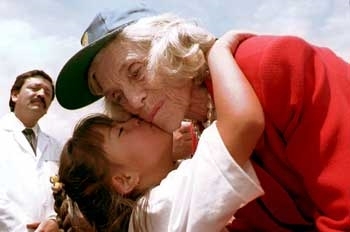 |
| An athlete kisses Eunice Kennedy Shriver, 2009 (Special Olympics) |
But one person had started a small, but growing, movement ten years earlier: Eunice Kennedy Shriver. Mrs. Shriver knew from her own sister Rosemary’s experience how marginalized the intellectually disabled were. When she started Special Olympics 40 years ago, it introduced the intellectually disabled to sports. Through sports they would not only develop their physical skills and talents, but learn about teamwork, perseverance, self-discipline, responsibility, courage, hope, faith, honesty, and so on. And in doing so, they would also develop a sense of self-esteem and self-worth.
At first the events seemed to be more like field days than truly competitive athletic events. The training of the athletes was sporadic. The coaches were not necessarily professional. The enforcement of rules was lackluster. There were even clowns at the finishing line to greet the finishers. While the intent of the coaches and event organizers was honorable, the events themselves seemed to do more to reinforce the negative stereotypes people held against the intellectually disabled than to change them. So, it wasn’t long before Shriver, much to Beau’s relief, called an end to these types of events and called on Special Olympics leaders to set and maintain the same standards of training, performance, rule enforcements, and competitive environment for the intellectually disabled as was expected of the non-disabled.
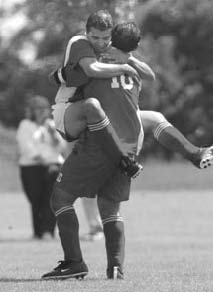 |
| Special Olympics Unified Sports (Special Olympics) |
Special Olympics began a transformation that was to lead them even closer to changing the attitudes of those who remained ignorant about the gifts and talents of the intellectually disabled. Almost immediately Special Olympic leaders and volunteers instituted rigorous year-round training schedules with trained coaches who brought with them uncompromising performance standards that equaled, and even surpassed, athletes from so-called mainstream schools and organizations.
And while there were some who resisted Shriver’s call to excellence, Beau was not one of them. Beau had a vision—-a big vision, a vision that would take the intellectually disabled beyond segregated sports arenas and onto playing fields and competitive venues where they could compete on teams with those who did not have intellectual disabilities.
He knew that in order to change attitudes and change lives, in order for the “r-word” to be retired from our collective vocabulary and for the intellectually disabled to be received as equals, people without intellectual disabilities would have to see and experience them for who they were: equals not only on the playing field but in the lunch room, at proms, and in the classroom.
To do this Beau introduced a bold and revolutionary concept to Special Olympics. He recommended that the organization move toward integrated, or unified, sports events. That is, events that included those with intellectual disabilities and those who had none. They would practice as a team and compete with other unified teams. In this way Beau saw his athletes not only “competing among the best but competing as the best.” The benefits would be seen and unseen.
Unified Sports, as it is now called, would create a higher standard of athletic competition, increase the emphasis on teamwork and team spirit, and create a social bridge between the intellectually disabled and their peers in the mainstream. Bringing the Special Olympics movement to the schools would speed up the process of changing attitudes and changing lives of all those who came into the universe of unified competition. It is a well-known principal of sociology that when individual relationships develop between people who have a prejudice against each other, those prejudices quickly break down. With Unified Sports, intellectually disabled athletes and mainstreamed athletes develop personal relationships that help to dissolve old and tired prejudices. For Beau it was a beautiful thing to watch the non-disabled captain of the Basketball team invite his players with intellectual disabilities to join him and other teammates for lunch at the school cafeteria.
Since Beau’s unified sports effort was adopted by Special Olympics in 1989, it has become a program that is embraced throughout the United States, and from China to Europe. In Connecticut alone there are six full-time staff members at the Connecticut Association of Schools whose job it is to plan, promote and execute unified events at all grade levels all year round.
Simply by being a part of Special Olympics, people with intellectual disabilities have gained measurably in self-confidence, self-esteem and social skills, succeeding both on and off the playing field. Athletes have become leaders, working as coaches, referees, reporters, photographers, board members and spokespersons. Around the world, prejudgments, stereotypes, and recurrence of slurs are dissipating as people with intellectual disabilities, who once were thought to be a burden to society, are being moved from institutions to communities, and finally getting the opportunity to become productive citizens.
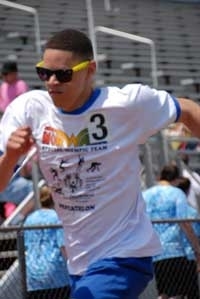 |
| At the SOCT Summer Games 2009 (Photo by K. Crockett) |
In the 2006 Special Olympics Connecticut Annual Report, Beau wrote:
“With each day we are one step closer to showing the world what we’ve come to understand—our athletes are not “people with intellectual disabilities,” they are just 'people,' and like all people they should be judged by their abilities, rather than their disabilities.”
“But, I didn’t do this alone,” Beau emphasizes in our interview. “My heroes are the volunteers. Particularly those volunteers who have no personal connection to the intellectually disabled. You know, they have been moved to help out because of some amazing amount of compassion. They’re the ones who participate once and are inspired forever. We couldn’t do it without them.”
It’s true, Special Olympics serves more than three million athletes with intellectual disabilities in more than 150 countries, providing year-round sports training and competition in 26 Olympics-type summer and winter sports. But even with that astounding service record, Beau wants to do more. After all, there are an estimated 170 million people with intellectual disabilities worldwide and 7 million that live in the United States, 20,000 estimated in the state of Connecticut alone. In other words, there is much work to be done and many more volunteers to be recruited to join in as coaches, officials, medical volunteers, photographers, event volunteers, and office volunteers.
Whether it’s for the penguin plunge, urban sports day, regional games, division tournaments, summer games or even the holiday sports classic, whether it’s once a week or once a month, or once a year as an individual, a school, or a family or group of friends, Beau invites all of us to enter into this inspiring universe of athletes.
You can discover volunteer opportunities by visiting www.soct.org
Page created on 7/29/2010 11:01:44 AM
Last edited 1/4/2017 10:54:36 PM
Read Beau's story on one of his own heroes--his father. Click here.
